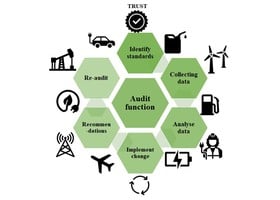Economic Development and the Audit Function in the Energy Sector
A special issue of Energies (ISSN 1996-1073). This special issue belongs to the section "C: Energy Economics and Policy".
Deadline for manuscript submissions: closed (31 January 2022) | Viewed by 3821

Special Issue Editor
Special Issue Information
Dear Colleagues,
The entire energy sector is subject to profound change. Market liberalisation and re-municipalisation, the expansion of the internal European market, the growing share of renewable energy, decentralisation of production, high-cost pressure and ambitious climate change targets are the drivers of this change. They pose unprecedented economic and technical challenges for grid operators and suppliers. At the same time, they offer market players unprecedented opportunities. Fierce competition between the various energy suppliers and grid operators will continue in the coming years. In the face of increasingly dynamic funding and regulatory systems, business models are also subject to severe transformation and adjustment pressure. However, a recurring issue in the energy sector is trust. A future focus, compliance-wise, needs to be on preventing breaches through developing a culture of transparency and trust, placing integrity at the heart of compliance activities. By implementing tools and technology that harness data and information, we can monitor and verify activity and identify potential breaches before they occur; this objective can be achieved through the audit function, thus contributing to the restoration of trust.
We are looking forward to receiving your contributions.
Dr. Melinda Timea Fülöp
Guest Editor
Manuscript Submission Information
Manuscripts should be submitted online at www.mdpi.com by registering and logging in to this website. Once you are registered, click here to go to the submission form. Manuscripts can be submitted until the deadline. All submissions that pass pre-check are peer-reviewed. Accepted papers will be published continuously in the journal (as soon as accepted) and will be listed together on the special issue website. Research articles, review articles as well as short communications are invited. For planned papers, a title and short abstract (about 100 words) can be sent to the Editorial Office for announcement on this website.
Submitted manuscripts should not have been published previously, nor be under consideration for publication elsewhere (except conference proceedings papers). All manuscripts are thoroughly refereed through a single-blind peer-review process. A guide for authors and other relevant information for submission of manuscripts is available on the Instructions for Authors page. Energies is an international peer-reviewed open access semimonthly journal published by MDPI.
Please visit the Instructions for Authors page before submitting a manuscript. The Article Processing Charge (APC) for publication in this open access journal is 2600 CHF (Swiss Francs). Submitted papers should be well formatted and use good English. Authors may use MDPI's English editing service prior to publication or during author revisions.
Keywords
- Energy sector
- Internal audit
- Audit committee
- Financial audit
- Transparency
- Corporate reporting.





